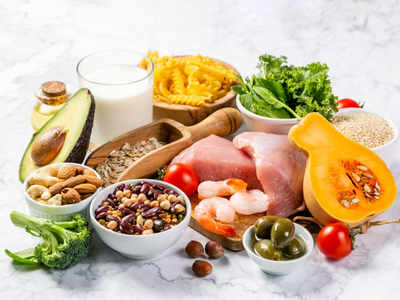- News
- lifestyle
- health-fitness
- diet
- Autoimmunity and Cancer
Trending
This story is from September 19, 2019
Autoimmunity and Cancer
The immune system plays a significant role in the development of autoimmune diseases, chronic inflammatory diseases, and cancer.

Cancer is a wide term for a variety of diseases that share characteristics such as uncontrollable, abnormal, and virulent growth of cells.
The immune system plays a significant role in the development of autoimmune diseases, chronic inflammatory diseases, and cancer. Immunity and Cancer – both influence each other, and there have been multiple studies that have established an association between the two.Autoimmunity is a disorder of the immune system in which the body attacks itself and the immune system mistakenly produces antibodies against healthy cells.
Immune responses can both - promote and counteract cancer. An immune response is essential for protection against the development of cancer. However, abnormal activation of the immune system may also lead to a risk of autoimmunity.
In a state of perpetual activation, immune mediators (cytokines, chemokines, and free radicals) may cause tissue damage leading to chronic inflammation, and subsequently, increase the risk of cancer.
Many autoimmune or inflammatory conditions are associated with increased risk for malignancies. Cancer risk due to inflammation is not limited to areas with specific focal organ damage. Celiac disease or
Evidence demonstrates that chronic inflammation and autoimmunity are associated with the development of malignancy. Additionally, patients with a primary malignancy may develop the autoimmune-like disease.
It is no surprise that we have witnessed an unprecedented surge in both – autoimmunity and malignancies in the recent past. While these may be multi-factorial, the role of diet is established.
A nutrient-dense diet, rich in plant-food, fruits, vegetables, enzymes, antioxidants, phytonutrients, fibre, vitamins, minerals, healthy fats, adequate-protein, water, and low in salt, sugar, processed foods, preservatives, pesticides, genetically-modified foods, and alcohol, should help lower risk of cancer and auto-immunity. No single food or nutrient will remove the risk of cancer. Needless to say, that avoidance of smoking, maintenance of optimum body weight, regular physical activity and stress management, are critical to the prevention of the disease.
Guidelines for cancer prevention and treatment
Specific instructions
Vegetables and fruits
Include at least 5-7 servings of vegetables and fruits
Half your vegetable intake should be raw vegetables in the form of salads or vegetable juice
Raw vegetable juices with a small amount of seasonal fruits include carrot, cucumber, tomatoes, beetroot, bottle gourd, pumpkin, spinach (washed thoroughly). For example: ABC (Apple + Beetroot + Carrot)
Add special boosters to the vegetable juice including neem, tulsi, curry leaves, celery, parsley, papaya leaves, coriander, amla, haldi, ginger, wheatgrass, aloe vera, giloe.
Limit intake of fruit juices
Step-up intake of green leafy vegetables
ABC juice: Amla, Beetroot and Carrot juice
2. Grains
Avoid: Wheat (atta, maida, dalia, sooji, rava, upma, couscous, vermicelli, sevian)
Barley (beer), rye, oats (gluten-free oats)
Corn (polenta, sweet corn, popcorn, nachos)
Soya (soya granules, soya chaap, soya milk, soya sauce)
Other restricted grains: buckwheat, sabudana, amaranth
Suggested grains: Jowar, bajra, ragi, quinoa, rice or brown rice
Soak your grains as far as possible
Sprouts are alkaline and a good source of vitamin C and certain other essential nutrients. Steamed may be better tolerated
3. Dairy
Milk may be hard to tolerate
Milk and milk products as advised. Recommend organic A-2 milk
You may include dahi, lassi or chaach, paneer, etc.
4. Lean meat, egg, fish and chicken
Avoid processed meat like cold cuts like sausages, salami, ham, etc
Prefer organic eggs, meat, poultry, fish. Restrict to no more than 120 grams a day
5. Nuts and seeds
Seeds are a rich source of essential fats including omega -3. Include flax, chia seeds, sesame, sunflower, melon, watermelon, pumpkin, poppy seeds. Prefer soaked seeds. Makhanas (lotus seeds) are also useful for calcium and protein.
Nuts are a storehouse of antioxidants like vitamin E, zinc and selenium which fight free radicals and prevent cancer. Include almonds, walnuts, cashews, etc. Prefer soaked nuts.
6. Fats and oil
Suggested fats: mustard oil, virgin coconut oil, extra virgin olive oil, rice bran oil, butter, and desi ghee
Try and include good fats like omega-3 from fish, flax seeds, chia seeds, mustard seeds, etc.
Avoids trans fats (hydrogenated fats) from vanaspati, margarine, commercially prepared fried namkeen, fried foods & some packaged foods, etc
Avoid refined oils
7. Sugar and salt
Limit salt & sugar intake from packaged foods, desserts, sugar-sweetened beverages, etc.
Prefer honey, jaggery in limited amounts.
Rock salt is preferable over-refined.
8. Water
Prefer alkaline or natural spring water
9. Supplements
Address nutritional deficiencies specially vitamin D, vitamin C, B vitamin, vitamin B12, calcium, magnesium, zinc and selenium under supervision
Selenium while important can be toxic in access
10. Special Foods
Probiotics: curd, fermented milk products such as chaach and lassi, etc.
Prebiotics: Isabgol, onion, garlic, etc.
Green tea
Wheatgrass
Beetroot
Aloe vera
Spirulina
Some varieties of mushrooms (Shittake)
Giloe
Ashwagandha
Turmeric has been shown to inhibit or stop the formation of many different types of cancers in animals exposed to known carcinogens. Turmeric can also help to reverse cancer.
Garlic has some special sulphur compounds called “Allylsulphides”, which have been found to increase the production of detoxification enzymes that help breakdown cancer-causing compounds and toxins and enhance their removal from the body.
Amla a rich source of vitamin C to increase immunity. Vitamin C is a powerful scavenger of free radicals, which cause cell damage leading to cancer, therefore it can play a significant role in cancer prevention. It acts as a body coolant and flushes out body toxins.
Lemon rind
Drumstick leaves (Moringa Oleifera)
Sour Sop Fruit (Lakshman Phal) has been known to possess strong anti-cancer properties.
General instructions
-Manage your weight and waist
-Exercise regularly
-Stay positive, manage stress and practice yoga
-Organic and non-GMO food as far as possible. Avoid or minimise microwave, aluminum, and plastic in the kitchen
-Recognize your food sensitivities, common one includes lactose, gluten, corn
Good nutrition along with regular physical exercise and a positive state of mind can help recover and maintain good health.
Suggested plan
-Aloe Vera (2-3 Tablespoons) on empty stomach followed by water
-Soaked almonds (5-10) + walnut (2) + apricot (2)
-Leaf of papaya (deveined) juiced + moringa + coriander + mind + celery + tulsi + spinach + cabbage + wheatgrass + cucumber + lettuce + amla + pomegranate + asparagus + sprouts
-ABC- Apple + Beetroot + Carrot juice
-Freeze-dried lemon grated mint
-Soursop
-Haldi milk
-Ground seeds over salad or soup
-Soak overnight in little water- 1fig + 1 apricot + 1 date + 1tsp honey (prefer manuka) with breakfast
-Drumstick leaves (moringa) 2tbs leaves
--Broccoli (organic preferably) ½ cup cooked
By Ishi Khosla, Clinical nutritionist, author, researcher
This article is exclusively produced for The Times of India Healthy India, Fit India by our partner, Indian Cancer Society.
The immune system plays a significant role in the development of autoimmune diseases, chronic inflammatory diseases, and cancer. Immunity and Cancer – both influence each other, and there have been multiple studies that have established an association between the two.Autoimmunity is a disorder of the immune system in which the body attacks itself and the immune system mistakenly produces antibodies against healthy cells.
Immune responses can both - promote and counteract cancer. An immune response is essential for protection against the development of cancer. However, abnormal activation of the immune system may also lead to a risk of autoimmunity.
In a state of perpetual activation, immune mediators (cytokines, chemokines, and free radicals) may cause tissue damage leading to chronic inflammation, and subsequently, increase the risk of cancer.
Additionally, ongoing stimulation and subsequent rapid growth of the immune cells in this setting may contribute to malignant cell growth. Other factors affecting immune activity, such as genetic factors, environmental exposure to carcinogens, and toxic pharmacological treatments, may also bolster the growth of cancer.
Many autoimmune or inflammatory conditions are associated with increased risk for malignancies. Cancer risk due to inflammation is not limited to areas with specific focal organ damage. Celiac disease or
gluten intolerance targets the gut and is associated with an elevated risk of gastrointestinal malignancies. This risk may be reduced or eliminated in patients who remove gluten, the inciting antigen, from their diets. Similarly, common manifestations of SLE (Systemic lupus erythematosus) include Lupus Nephritis (inflammation of the kidney) and Lupus Cerebritis (inflammation of the brain), and evidence suggests increased rates of kidney and brain cancer in these patients. Likewise, patients with rheumatoid arthritis frequently experience chronic lung tissue inflammation eventually leading to interstitial lung disease, which likely predisposes to increased lung cancer risk.
Evidence demonstrates that chronic inflammation and autoimmunity are associated with the development of malignancy. Additionally, patients with a primary malignancy may develop the autoimmune-like disease.
It is no surprise that we have witnessed an unprecedented surge in both – autoimmunity and malignancies in the recent past. While these may be multi-factorial, the role of diet is established.
A nutrient-dense diet, rich in plant-food, fruits, vegetables, enzymes, antioxidants, phytonutrients, fibre, vitamins, minerals, healthy fats, adequate-protein, water, and low in salt, sugar, processed foods, preservatives, pesticides, genetically-modified foods, and alcohol, should help lower risk of cancer and auto-immunity. No single food or nutrient will remove the risk of cancer. Needless to say, that avoidance of smoking, maintenance of optimum body weight, regular physical activity and stress management, are critical to the prevention of the disease.
Guidelines for cancer prevention and treatment
Specific instructions
Vegetables and fruits
Include at least 5-7 servings of vegetables and fruits
Half your vegetable intake should be raw vegetables in the form of salads or vegetable juice
Raw vegetable juices with a small amount of seasonal fruits include carrot, cucumber, tomatoes, beetroot, bottle gourd, pumpkin, spinach (washed thoroughly). For example: ABC (Apple + Beetroot + Carrot)
Add special boosters to the vegetable juice including neem, tulsi, curry leaves, celery, parsley, papaya leaves, coriander, amla, haldi, ginger, wheatgrass, aloe vera, giloe.
Limit intake of fruit juices
Step-up intake of green leafy vegetables
ABC juice: Amla, Beetroot and Carrot juice
2. Grains
Avoid: Wheat (atta, maida, dalia, sooji, rava, upma, couscous, vermicelli, sevian)
Barley (beer), rye, oats (gluten-free oats)
Corn (polenta, sweet corn, popcorn, nachos)
Soya (soya granules, soya chaap, soya milk, soya sauce)
Other restricted grains: buckwheat, sabudana, amaranth
Suggested grains: Jowar, bajra, ragi, quinoa, rice or brown rice
Soak your grains as far as possible
Sprouts are alkaline and a good source of vitamin C and certain other essential nutrients. Steamed may be better tolerated
3. Dairy
Milk may be hard to tolerate
Milk and milk products as advised. Recommend organic A-2 milk
You may include dahi, lassi or chaach, paneer, etc.
4. Lean meat, egg, fish and chicken
Avoid processed meat like cold cuts like sausages, salami, ham, etc
Prefer organic eggs, meat, poultry, fish. Restrict to no more than 120 grams a day
5. Nuts and seeds
Seeds are a rich source of essential fats including omega -3. Include flax, chia seeds, sesame, sunflower, melon, watermelon, pumpkin, poppy seeds. Prefer soaked seeds. Makhanas (lotus seeds) are also useful for calcium and protein.
Nuts are a storehouse of antioxidants like vitamin E, zinc and selenium which fight free radicals and prevent cancer. Include almonds, walnuts, cashews, etc. Prefer soaked nuts.
6. Fats and oil
Suggested fats: mustard oil, virgin coconut oil, extra virgin olive oil, rice bran oil, butter, and desi ghee
Try and include good fats like omega-3 from fish, flax seeds, chia seeds, mustard seeds, etc.
Avoids trans fats (hydrogenated fats) from vanaspati, margarine, commercially prepared fried namkeen, fried foods & some packaged foods, etc
Avoid refined oils
7. Sugar and salt
Limit salt & sugar intake from packaged foods, desserts, sugar-sweetened beverages, etc.
Prefer honey, jaggery in limited amounts.
Rock salt is preferable over-refined.
8. Water
Prefer alkaline or natural spring water
9. Supplements
Address nutritional deficiencies specially vitamin D, vitamin C, B vitamin, vitamin B12, calcium, magnesium, zinc and selenium under supervision
Selenium while important can be toxic in access
10. Special Foods
Probiotics: curd, fermented milk products such as chaach and lassi, etc.
Prebiotics: Isabgol, onion, garlic, etc.
Green tea
Wheatgrass
Beetroot
Aloe vera
Spirulina
Some varieties of mushrooms (Shittake)
Giloe
Ashwagandha
Turmeric has been shown to inhibit or stop the formation of many different types of cancers in animals exposed to known carcinogens. Turmeric can also help to reverse cancer.
Garlic has some special sulphur compounds called “Allylsulphides”, which have been found to increase the production of detoxification enzymes that help breakdown cancer-causing compounds and toxins and enhance their removal from the body.
Amla a rich source of vitamin C to increase immunity. Vitamin C is a powerful scavenger of free radicals, which cause cell damage leading to cancer, therefore it can play a significant role in cancer prevention. It acts as a body coolant and flushes out body toxins.
Lemon rind
Drumstick leaves (Moringa Oleifera)
Sour Sop Fruit (Lakshman Phal) has been known to possess strong anti-cancer properties.
General instructions
-Manage your weight and waist
-Exercise regularly
-Stay positive, manage stress and practice yoga
-Organic and non-GMO food as far as possible. Avoid or minimise microwave, aluminum, and plastic in the kitchen
-Recognize your food sensitivities, common one includes lactose, gluten, corn
Good nutrition along with regular physical exercise and a positive state of mind can help recover and maintain good health.
Suggested plan
-Aloe Vera (2-3 Tablespoons) on empty stomach followed by water
-Soaked almonds (5-10) + walnut (2) + apricot (2)
-Leaf of papaya (deveined) juiced + moringa + coriander + mind + celery + tulsi + spinach + cabbage + wheatgrass + cucumber + lettuce + amla + pomegranate + asparagus + sprouts
-ABC- Apple + Beetroot + Carrot juice
-Freeze-dried lemon grated mint
-Soursop
-Haldi milk
-Ground seeds over salad or soup
-Soak overnight in little water- 1fig + 1 apricot + 1 date + 1tsp honey (prefer manuka) with breakfast
-Drumstick leaves (moringa) 2tbs leaves
--Broccoli (organic preferably) ½ cup cooked
By Ishi Khosla, Clinical nutritionist, author, researcher
This article is exclusively produced for The Times of India Healthy India, Fit India by our partner, Indian Cancer Society.
End of Article
FOLLOW US ON SOCIAL MEDIA









